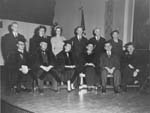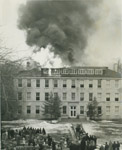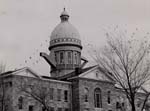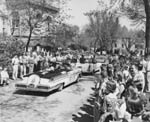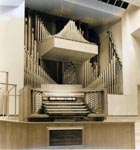On a small scale, Augustana's fortunes mirrored the United States' increasing prosperity post-World War II. The 1950s were a busy decade, in which the college more than once obtained national distinction and its campus expanded significantly in size. Academically, Augustana opened the decade by establishing its own chapter of Phi Beta Kappa, the academic honor society. By the later '50s, it was celebrating its victory over a number of much larger universities in the National Debate Tournament at West Point. Meanwhile, a generous donation of land from the Davis-Weyerhaeuser family increased the size of the campus from 60 to 86 acres, and a bequest from J. M. and Elsa N. Westerlin financed construction of a new women's dormitory on the donated property. Bergendoff Hall of Fine Arts and Centennial Hall were built beginning in the mid-1950s. Slowly but surely, Augustana's grounds were taking on an aspect that would be familiar even to a 21st-century observer.
- March 17, 1950
- Augustana chapter of Phi Beta Kappa (PBK) established as the Zeta chapter of Illinois. The college earned its charter in this prestigious academic honor society in 1949, and it was among the first group of schools to do so after an eight-year hiatus in granting charters due to World War II. A large part of Augustana's success in obtaining membership was thanks to the Runic Honor Society, a campus organization chaired by English professor Henriette C. K. Naeseth, that existed to promote high-quality scholarship and work toward a chapter of ?BK. The Augustana faculty and ?BK members who submitted the college's application were Naeseth, T. L. Richter, O. F. Ander and Lucien White.
- November 13, 1952
- WAUG's first broadcast. WAUG is the result of extensive effort by junior Bill Lindholm ('54), who began investigating the possibility of a campus radio station as a freshman. The first broadcast features a 15-minute news program, hosted by Lindholm, followed by music for the remainder of the evening. In its earliest stages, WAUG broadcasts from 6:30-11 nightly, and only to campus dormitories. By the early 1960s, the campus radio station will have an educational FM broadcasting license; it will change its name to WVIK, which will receive a grant from the Corporation for Public Broadcasting in the late 1970s to become a public broadcasting station.
- June 30, 1954
- Augustana acquires House on the Hill and the future site of Westerlin Hall. The college receives a 26-acre tract of land, including a mansion and other buildings, as a gift from Edwin Davis of St. Paul, whose grandfather, Frederick Weyerhaeuser, had desired that the property should become Augustana's after the family no longer needed it. This gift increases by half the size of Augustana's campus and makes possible the planning of a new dormitory. Dean of Women, later Associate Dean of Students, Betsey Brodahl moves into the mansion, known as House on the Hill, as resident curator in 1954 and will live there until 2003. The second and third floors become home to women students, while portions of the first floor are used for special events.
- February 18, 1955
- Fire in Wallberg Hall. The building's fourth level, an attic underneath a wood roof, is destroyed. The college uses funds from the Wallberg Endowment to renovate, creating a full fourth floor for the science building.
- June 1, 1955
- Construction completed on Bergendoff Hall of Fine Arts. Although Bergendoff and Centennial were planned together, they are built separately; thus, the former is completed first. Bergendoff initially houses the departments of music, art, and speech. It will be known simply as the Fine Arts Building until being officially named for President Conrad Bergendoff in 1960.
- November 14, 1955
- Teapot Dome. In the middle of the night of November 13, a group of fraternity men use their rock-climbing gear to scale Old Main and attach a spout and handle to the dome. "Teapot Dome" is visible for miles and makes the news wires as far away as Chicago.
- April 9, 1957
- "Hell Week" abolished as part of the fraternity and sorority initiation process. A press release announces that, while Greek groups make valuable contributions to campus, hazing practices have "nothing to do with education, either higher or Christian"; all Greek social organizations are to re-write their constitutions to be in compliance with the new policy.
- April 27, 1957
- Augustana debate team wins National Debate Tournament at the United States Military Academy, West Point. Phillip Hubbart ('58) and Norman Lefstein (who completed a bachelor of laws at the University of Illinois in 1961) traveled to the tournament with their debate coach, speech professor Martin J. Holcomb. They defeat host school West Point in the finals; moreover, their appearance at this year's tournament makes Augustana the only college or university to qualify every year since the tournament began in 1947. To celebrate Hubbart and Lefstein's victory, Augustana arranges for a motorcade, complete with police escort, to carry them on the last leg of their journey back to Rock Island on April 30; a celebratory convocation will follow.
- This same weekend, G. Timothy Johnson ('58) wins the men's Interstate Oratorical Contest of the Interstate Oratorical Association at Michigan State University, East Lansing, with a speech entitled "Why Elvis Presley?"; he is honored at the same convocation as Hubbart and Lefstein. Johnson will later receive national prominence as the chief medical correspondent for ABC News. Previous Augustana winners at the Interstate Oratorical Contest were Hugo Pearson ('43) in 1943 and Marilyn Busekros ('55) in 1954.
- November 3, 1957
- Westerlin Hall dedicated. The new dormitory is named for J. M. and Elsa N. Westerlin, whose bequest to Augustana financed construction; it stands on the Davis-Weyerhaeuser property, which was gifted to Augustana in 1954. Westerlin Hall includes an eating area as well as dorm rooms, and it initially houses women students. Two additional wings-Immanuel Hall and Jenny Lind Hall-will be added in the early 1960s.
- Fall 1959
- Centennial Hall opens. The building was planned specifically for use by Augustana's music program, with particular attention given to the needs of the Oratorio Society. The Illinois Institute of Technology conducted a study in the planning stages to determine the auditorium's acoustical design. The new building is named Centennial Hall in honor of Augustana's 100th anniversary, to be celebrated in 1960.
- Co-ed dining begins. In spring 1959 the administration, as reported by the Augustana Observer, approved co-ed dining as a "permanent" element of the Augustana scene; prior to the 1959-1960 school year it was only an occasional event. Co-ed meals are Sundays at noon, with provisions taken to ensure that all male and female students have the opportunity to visit each others' dormitory dining halls.
- November 15, 1959
- Crosell Memorial pipe organ dedicated in Centennial Hall. The $80,000 pipe organ was purchased with money granted to Augustana in the will of Clara Josephine Peterson Crosell ('05), who studied piano in her years as a student. Robert Baker, organist and organ teacher in New York City, gives a concert for the dedication.

